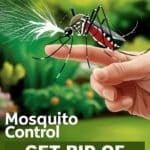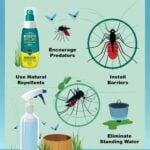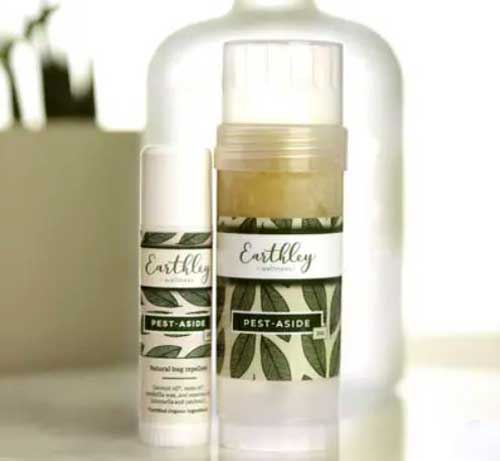How to Get Rid of Mosquitoes – Effective Natural Solutions
This post may contain affiliate links. Read my full disclosure here.
Mosquitoes are more than just a nuisance; they can transmit diseases like malaria, dengue, and West Nile virus. Controlling them effectively involves targeting their breeding grounds, using natural repellents, and encouraging natural predators. Below are the best strategies to eliminate mosquitoes from your home and garden using organic and environmentally friendly methods.
Remember, the best solutions work with nature, not poison. When we create a healthier environment in our yard, we set up conditions that favor the predators and not the mosquitoes.
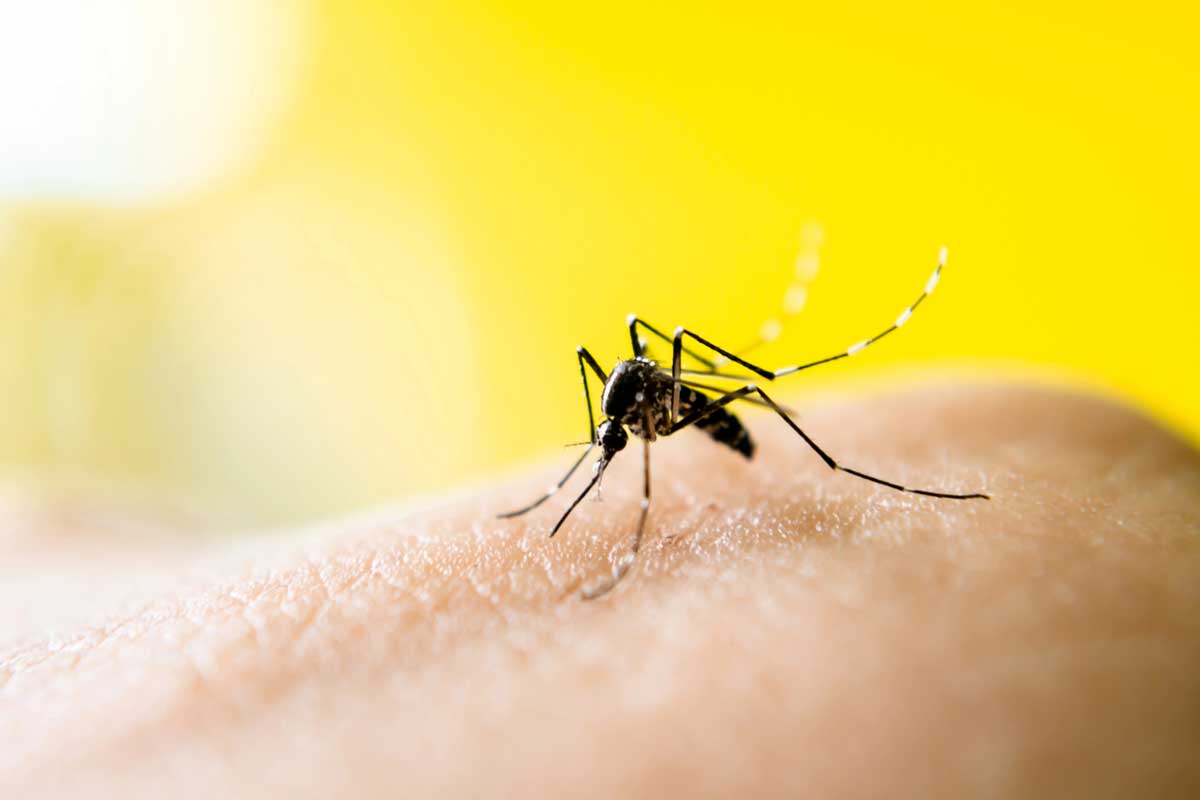
Table of contents
Get Rid of Mosquitoes by Eliminating Standing Water
Mosquitoes lay their eggs in water that is stagnant, shallow and high in organic matter. Get rid of the standing water, and you get rid of the mosquito eggs.
Mosquitoes complete three stages of their life cycle in the water (egg, larva and pupa) in about 4 to 14 days. This means that standing water must remain stagnant for a minimum of 4 days in order to support the mosquito’s life cycle. Elimination of potential mosquito breeding sites is the primary control measure used to reduce mosquito populations.
- Remove any objects around your yard that may collect water, such as buckets or toys with openings that hold water
- Place screen with small holes over rain barrels
- Use a pump or fountain in ponds to aerate the water. (This solar fountain will let you aerate small areas without running electricity)
- Replace any standing water in pools or bird baths once a week
Use Organic Mosquito Larvicides
For areas where water cannot be drained, organic larvicides can help:
- Treat water with mosquito dunks. Mosquito dunks slowly release Bacillus thuringiensis v. israelensis (BT) in water. BT is toxic for mosquito larvae but considered safe for humans
- Neem Oil: Adding a few drops of neem oil to standing water can prevent mosquitoes from developing.

Encourage Natural Predators
Many creatures naturally prey on mosquitoes. By promoting these beneficial species, you can reduce mosquito populations naturally.
- Introduce mosquito-eating fish like guppies and goldfish to ponds.
- Encourage bats by installing bat houses.
- Attract dragonflies by planting native vegetation near water sources.
- Foster birds such as purple martins and swallows, which feed on adult mosquitoes.
- Support beneficial insects like damselflies, predatory beetles, and certain spiders that consume mosquito larvae or adults.
- Maintain a habitat for water striders, which hunt mosquito larvae on the surface of ponds. Avoid fertilizer or pesticide runoff into ponds.
Hang bird feeders and build nest boxes. Build a bat houses and mount them where they receive morning sun. Invert broken terracotta pots to make frog houses in your garden. All of these amazing creatures will help you get rid of mosquitoes.
While adult mosquitoes only make up 2-3% of a typical bat diet, they may impact mosquito reproduction. This is because they eat blood filled females who fly slower and are easier to catch. (They also make a more substantial meal.)
Michigan researchers tested this hypothesis. They built two enclosures in a wooded area, one with bats and one without, where insects could come and go freely. Within the enclosure, they placed standing water containers suitable for mosquito breeding areas.
Each day they counted the eggs laid in the standing water. At the end of the two month study, the enclosures with bats had 32% fewer mosquito eggs. (Source) Bats also eat common garden pests like corn earworm moths, cucumber beetles and June bugs.
Plant Natural Mosquito Repellents
Several herbs, and some flowers, have been known to deter mosquitoes and other biting insects. Herbs make a great addition to yards or vegetable gardens because they are visually pleasing and smell good! Lemon scented plants and others with strong aromas are some of the best to use.
Learn more about Mosquito Repellent Plants and How to Use Them.
Would you like to save this?

Create Natural Mosquito Sprays
Mosquito sprays and creams that use plants and essential oils are another option for repelling mosquitoes. You can make your own natural mosquito repellents with our easy recipes, found here.
If you’d rather have a ready-made option, try Earthley’s Pest Aside repellent stick. They use neem, citronella, and patchouli to create a salve that’s applied from a convenient tube.
Install Physical Barriers
Prevent mosquitoes from entering your home by using:
- Fine mesh screens on doors and windows.
- Mosquito nets over beds.
- Use fans to disrupt their flight.
Improve Soil and Garden Health
Mosquitoes thrive in damp environments. Improve soil drainage and use organic compost to keep soil aerated and less hospitable to mosquitoes. Keep grass trimmed to eliminate some of their hiding spots, especially in humid conditions.
Avoid Peak Mosquito Feeding Times
The most common mosquito species feed at dawn and dusk and a few hours into the night, while some aggressive species feed all day. Avoid peak feeding times to reduce your risk of getting bit.
Wear Light Clothing
Light outfits provide more protection from mosquitoes than dark outfits. Why?
Mosquitoes aren’t strong flyers, so they stay low to the ground. This means that they look up to target their prey. Dark colors stand out, while light shades blend into the sky. “Large, dark moving thing” usually means “food” to a mosquito.
Learn more about what attracts mosquitoes.
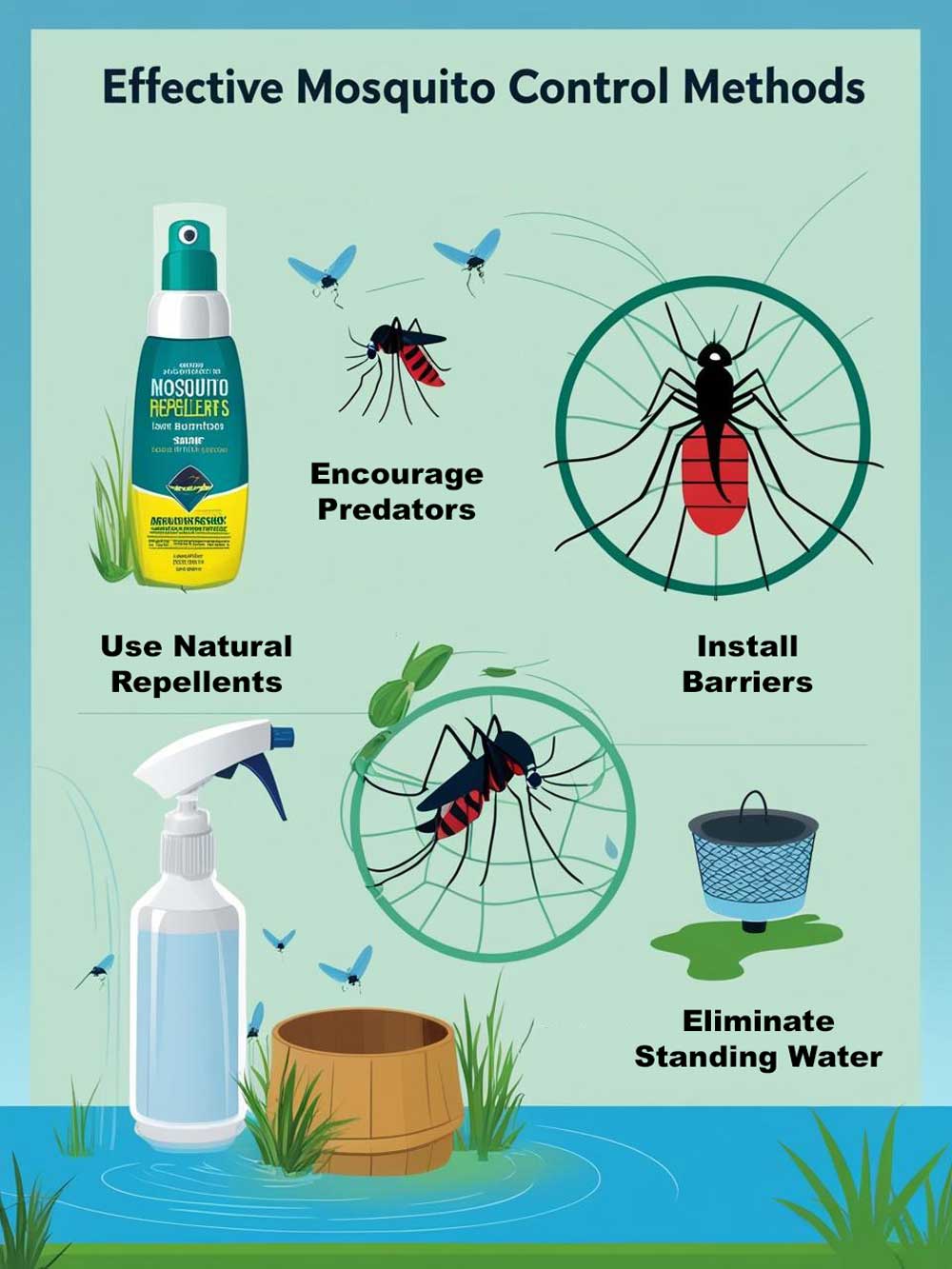
By combining these organic strategies, you can get rid of mosquitoes and reduce your chances of getting bitten. Whether in your garden, backyard, or home, these natural solutions offer a safe and sustainable way to combat mosquitoes.
If you found this article after you got bit, check out Natural Mosquito Bite Relief.

This post is by Amber Bradshaw of My Homestead Life. Amber and her family moved from their tiny homestead by the ocean in South Carolina to forty-six acres in the Smoky Mountains in East Tennessee.
While building their off-the-grid homestead, they live like the days of old – cooking without electricity, collecting water from the creek and raising chickens, goats, pigs, turkeys, bees, and guineas. They’ve recently filmed their journey for a TV show on the Discovery Channel and the DIY Network/HGTV called Building Off The Grid: The Smokey Mountain Homestead.

